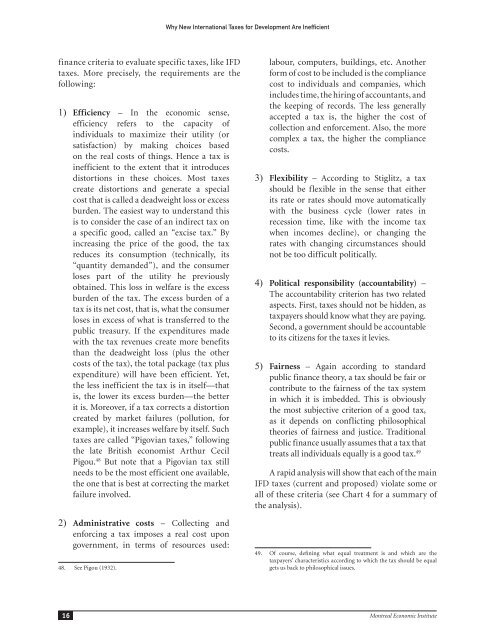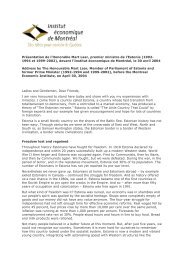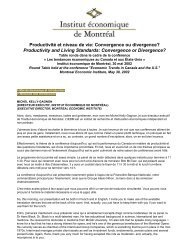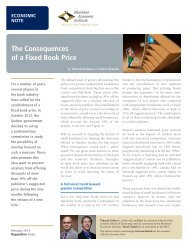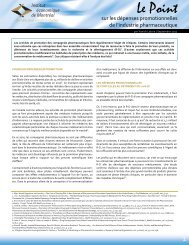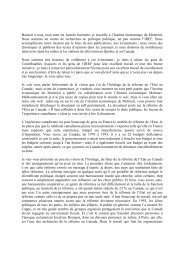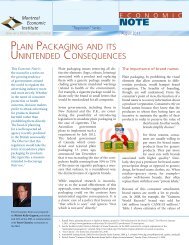Publication (PDF format) - Institut économique de Montréal
Publication (PDF format) - Institut économique de Montréal
Publication (PDF format) - Institut économique de Montréal
You also want an ePaper? Increase the reach of your titles
YUMPU automatically turns print PDFs into web optimized ePapers that Google loves.
Why New International Taxes for Development Are Inefficientfinance criteria to evaluate specific taxes, like IFDtaxes. More precisely, the requirements are thefollowing:1) Efficiency – In the economic sense,efficiency refers to the capacity ofindividuals to maximize their utility (orsatisfaction) by making choices basedon the real costs of things. Hence a tax isinefficient to the extent that it introducesdistortions in these choices. Most taxescreate distortions and generate a specialcost that is called a <strong>de</strong>adweight loss or excessbur<strong>de</strong>n. The easiest way to un<strong>de</strong>rstand thisis to consi<strong>de</strong>r the case of an indirect tax ona specific good, called an “excise tax.” Byincreasing the price of the good, the taxreduces its consumption (technically, its“quantity <strong>de</strong>man<strong>de</strong>d”), and the consumerloses part of the utility he previouslyobtained. This loss in welfare is the excessbur<strong>de</strong>n of the tax. The excess bur<strong>de</strong>n of atax is its net cost, that is, what the consumerloses in excess of what is transferred to thepublic treasury. If the expenditures ma<strong>de</strong>with the tax revenues create more benefitsthan the <strong>de</strong>adweight loss (plus the othercosts of the tax), the total package (tax plusexpenditure) will have been efficient. Yet,the less inefficient the tax is in itself—thatis, the lower its excess bur<strong>de</strong>n—the betterit is. Moreover, if a tax corrects a distortioncreated by market failures (pollution, forexample), it increases welfare by itself. Suchtaxes are called “Pigovian taxes,” followingthe late British economist Arthur CecilPigou. 48 But note that a Pigovian tax stillneeds to be the most efficient one available,the one that is best at correcting the marketfailure involved.2) Administrative costs – Collecting an<strong>de</strong>nforcing a tax imposes a real cost upongovernment, in terms of resources used:48. See Pigou (1932).labour, computers, buildings, etc. Anotherform of cost to be inclu<strong>de</strong>d is the compliancecost to individuals and companies, whichinclu<strong>de</strong>s time, the hiring of accountants, andthe keeping of records. The less generallyaccepted a tax is, the higher the cost ofcollection and enforcement. Also, the morecomplex a tax, the higher the compliancecosts.3) Flexibility – According to Stiglitz, a taxshould be flexible in the sense that eitherits rate or rates should move automaticallywith the business cycle (lower rates inrecession time, like with the income taxwhen incomes <strong>de</strong>cline), or changing therates with changing circumstances shouldnot be too difficult politically.4) Political responsibility (accountability) –The accountability criterion has two relatedaspects. First, taxes should not be hid<strong>de</strong>n, astaxpayers should know what they are paying.Second, a government should be accountableto its citizens for the taxes it levies.5) Fairness – Again according to standardpublic finance theory, a tax should be fair orcontribute to the fairness of the tax systemin which it is imbed<strong>de</strong>d. This is obviouslythe most subjective criterion of a good tax,as it <strong>de</strong>pends on conflicting philosophicaltheories of fairness and justice. Traditionalpublic finance usually assumes that a tax thattreats all individuals equally is a good tax. 49A rapid analysis will show that each of the mainIFD taxes (current and proposed) violate some orall of these criteria (see Chart 4 for a summary ofthe analysis).49. Of course, <strong>de</strong>fining what equal treatment is and which are thetaxpayers’ characteristics according to which the tax should be equalgets us back to philosophical issues.16Montreal Economic <strong>Institut</strong>e


